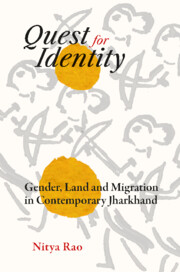6 - Migration, Representations and Social Relations: Experiences of Jharkhand Labour in Western Uttar Pradesh
Published online by Cambridge University Press: 26 July 2023
Summary
Introduction
Who can like this work? We work from dawn to dusk, day in and out. Peeling the sugarcane is not easy: the spines make your hands bleed. My employer does not beat me like many others do, but there is no dearth of prods and insults. I don't think I will come next year.
—Manjhi Tudu, a Santal migrant farm servant working in the fields of Ram Chaudhry, a Jat farmer of KalsiEvery year hundreds of Manjhis from Jharkhand travel to the irrigated high productivity agricultural areas of north-west India, the so-called Green Revolution belt, working arduously long hours to earn what they can. Circular migration, much of it seasonal, comprises an integral part of the livelihood strategies of a large number of poor people living in agriculturally marginal areas (Deshingkar and Farrington, 2009: 1). Some households barely manage to survive, while a few with some resources accumulate wealth over time (Mosse et al., 2002). It is contended that most would be worse off if they depended solely on local employment (Kothari, 2003; Rogaly and Rafique, 2003), yet the progression from survival to security of livelihoods cannot be taken for granted. Households and individuals are not unified entities. Earnings and savings from migration vary by ethnic group, gender, occupation, wage rates, living costs, contracting arrangements, and debts. In addition to the access to material resources and social networks, individual aspirations and perceptions of work and leisure, time horizons and rates of time preference, and strategies for ensuring future security are central to the experience and outcomes of migration.
Important in shaping livelihood opportunities, choices and outcomes are the nature and role of the democratic state in India. While claiming to be responsible and accountable to the people, especially the poor and vulnerable, it is far from this in its ‘everyday practice’ (Fuller and Benei, 2001). Notwithstanding processes of liberalisation and democratic decentralisation, the Indian state continues to be driven by elite interests and patronage ties (Corbridge and Harriss, 2000; Corbridge et al., 2005), with informal structures of caste dominance, patronage and brokerage influencing the nature and terms of inclusion in the migration process (Mosse, 2007), especially in a context where spatial, regional, caste and gender inequalities have intensified over the last two decades, as admitted by the Approach Paper to the Eleventh Five-Year Plan (Rao, 2010a).
- Type
- Chapter
- Information
- Quest for IdentityGender, Land and Migration in Contemporary Jharkhand, pp. 148 - 175Publisher: Cambridge University PressPrint publication year: 2024

